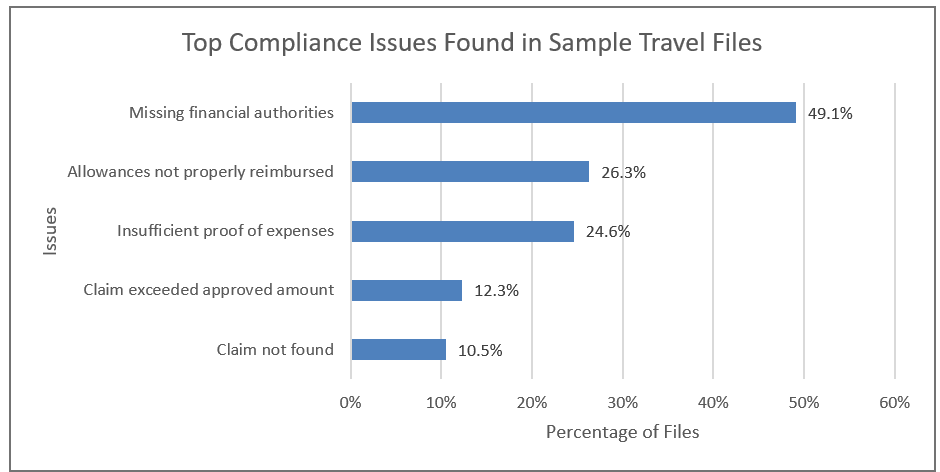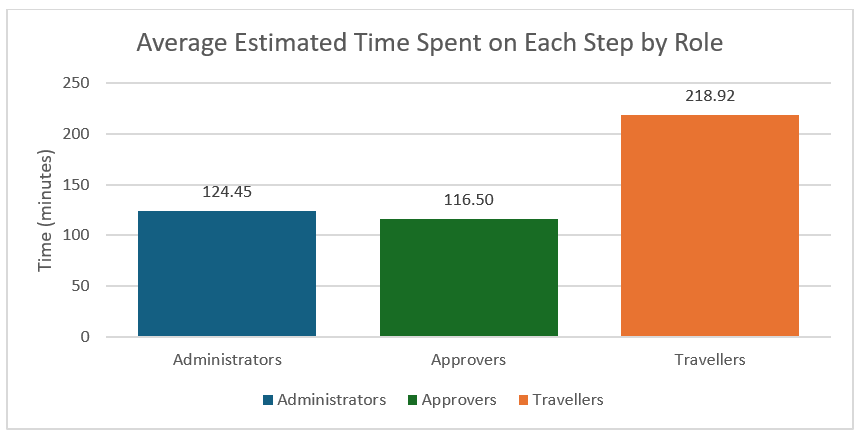Audit of the Travel Administration Process
April 2025
1259-3-0106 (ADM(RS))
Reviewed by ADM(RS) in accordance with the Access to Information Act. Information UNCLASSIFIED.
Table of Contents
Alternate Formats
Assistant Deputy Minister (Review Services)
| Key Findings | Recommendations |
|---|---|
Finding 1: |
Recommendation 1: OPI: ADM(Fin)/Chief Financial Officer (CFO)
|
Recommendation 2: OPI: ADM(Fin)/CFO |
|
Finding 2: |
Recommendation 3: OPI: ADM(Fin)/CFO |
Table 1 Summary
Background
Effective and efficient travel administration is critical to ensure mission readiness, operational efficiency and fiscal responsibility. A variety of policies and guidance documents have been created to ensure that the planning, authorization, recording and reporting of travel expenditures within DND/CAF are aligned with Government of Canada priorities and financial management practices. In FY 2023/24, DND/CAF spent approximately $325 million on travel activities including individual and collective training and operations.
Each L1 organization in DND/CAF has its own travel needs and travel budgets. From travel planning through approvals, bookings and claim finalization, the travel process is decentralized at the L1 level and below. All stakeholders and units are responsible for sound stewardship of related financial resources.
| Stakeholder | Roles and Responsibilities |
|---|---|
Travellers |
|
Administrators |
|
Approvers (delegated authorities/Responsibility Centre managers) |
|
ADM(Fin)/CFO |
|
Table 2 Summary
Key Findings
Finding 1: Unclear roles and responsibilities for travel impact the effectiveness of travel administration and increase financial risk to the Department.
Travel administration within DND/CAF is a complex process and involves numerous stakeholders to complete travel requests and reimbursements. While ADM(Fin)/CFO is the Department’s functional authority for financial management, there is no process owner or functional authority formally designated for the travel process within DND/CAF. As well, accountabilities, roles and responsibilities specifically for travel authorities and users within the Department are not always clear. This can limit oversight and controls to ensure compliance and financial stewardship.
The Financial Administration Manual’s chapter on travel expenditures identifies 14 positions or groups with responsibilities in the travel process. In the same policy, three user groups are collectively accountable for all travel expenses and ensuring that all approvals and administrative activities are completed. These factors, in addition to the volume of other policies and guidance, make it difficult for users to understand their roles and navigate the travel process efficiently.
Multiple users perform review and approval activities in the travel process. Despite this, 81 percent of the sample of 74 travel files reviewed were not fully in compliance with travel policies, as shown in Figure 1. Of these files with compliance issues, near half of the files did not have sufficient evidence of authorities for travel or reimbursement, and approximately 26 percent had reimbursement errors. In some cases, immediate action was taken to recover overpayments identified by the audit team.

Figure 1 Summary
ADM(Fin) does not conduct post-payment verification checks to confirm the validity of travel claims due to their low materiality risk. At the L1 level or lower, Public Funds Accounting Officers at military bases or DND units oversee a 10-percent cursory review on low-risk financial transactions, but travel-related transactions are not mandated to be included. Inconsistent transaction descriptions in the Defence Resource Management Information System can also hinder effective oversight and decision making as data irregularities may impact the ability to accurately identify and review travel expenses.
Enhanced controls, such as increased verification checks and data input rules, would improve compliance; decrease the risk of errors and unauthorized expenses; and reduce the potential for harm to the organization’s financial ability and credibility. Establishing a functional authority to oversee the travel process would facilitate the implementation of more effective controls.
ADM(RS) Recommendation
Management Response
ADM(Fin) recognizes its role as the functional authority for the travel administration process.
ADM(RS) Recommendation
Management Response
As the functional authority for travel at DND/CAF and subject to securing sufficient funding, ADM(Fin) will establish a Defence Travel Management Office (DTMO), the centre of expertise to ensure that Treasury Board (TB) policies are being respected by developing policies and procedures across DND/CAF. DTMO will be responsible for implementing SOPs, guidance and training.
This office will also be responsible for providing oversight to ensure users adhere to policy and procedures and providing oversight on the stewardship of financial resources.
Finding 2: Policies and tools exist but are not optimized for user needs.
Policies, guidance and tools are in place to guide travel users; however, the Treasury Board Secretariat, ADM(Fin) and other related travel policies and SOPs are complex and lengthy. There are more than 370 pages of information. Some of these documents are repetitive or inconsistent: For example, the procedure to start a travel authorization is different in the ClaimsX user manual and the National Defence SOPs. Without consistent and easy to follow guidance, travellers and approvers may encounter errors and inefficient use of time.
Because practices and systems for approvals, bookings and claims are not integrated, the overall process is challenging. For instance, users need to conduct research on travel options, then enter travel details and costs into an individual travel authorization form. A Defence Resource Management Information System user then creates a financial commitment number and adds it to the individual travel authorization form as part of the pre-travel approval process. Flight and rail bookings are made in the American Express Global Business Travel system, then the details of the approved travel plan and financial coding are manually entered into ClaimsX.
As all the previously mentioned tools and systems work independently from each other, information must be entered repetitively. Upon return from travel, users cannot upload digital documents to ClaimsX. Consequently, paper-based supporting documents need to be submitted for manual review and authorization in addition to submitting the claim for electronic review and authorization in ClaimsX. This results in duplication of section 34 and triplication of section 32 approvals.
In addition, access to support and resources such as knowledgeable administrators and digital tools is inconsistent. Figure 2 illustrates the results of an efficiency analysis performed on traveller and approver questionnaire responses. It shows that, of all user groups, travellers spend the most time per step navigating the travel process. When they have access to help and tools, travellers tend to spend less time on the process in general.
Opportunities to improve efficiency include:
- improving the clarity of guidance to reduce user confusion and errors;
- integrating systems and tools to minimize the redundancy of data entry and errors;
- reducing dependency on paper-based processes, particularly those that result in duplication of effort; and
- reducing the numbers of review and transfer of files.

Figure 2 Summary
ADM(RS) Recommendation
Management Response
As the functional authority for travel at DND/CAF, ADM(Fin) will complete an environmental scan of all intranet material currently in use/published at the Department to consolidate the material into simple, standard and relevant reference materials that are straightforward for users.
Conclusion
Travel plays a significant role in delivering the Defence Team mandate. With increasing budget constraints and the rising costs of transportation and accommodations, it is essential for DND/CAF to ensure that resources are used efficiently and effectively in the travel process to aid operational readiness and demonstrate DND’s commitment to the responsible stewardship of public funds.
Annex A: Management Action Plan
ADM(RS) Recommendation
Management Action
1. ADM(Fin)/CFO clarifies/recognizes its role as the functional authority of the Department’s travel administration process.
| Deliverable | Timeline |
|---|---|
1.1 ADM(Fin)/CFO to recognize its role as the functional authority of the Department’s travel administration process. |
Complete |
Table A.1. Management Action Plan 1 Summary
ADM(RS) Recommendation
Management Action
2. As the functional authority for travel at DND/CAF and subject to securing sufficient funding, ADM(Fin) will establish a DTMO, the centre of expertise to ensure that TB policies are being respected by developing policies and procedures across DND/CAF. DTMO will be responsible for implementing SOPs, guidance and training.
This office will also be responsible for providing oversight to ensure users adhere to policy and procedures and providing oversight on the stewardship of financial resources.
| Deliverable | Timeline |
|---|---|
2.1 Establish a DTMO |
September 2025 |
| 2.2 Develop an implementation plan for ongoing monitoring and oversight of travel activities: | |
2.2a Establish procedures for undertaking risk-based compliance checks to identify and address travel-related issues, including:
|
December 2025 |
2.2b Implement enhanced controls, such as regular compliance checks across a sample of travel transactions, to ensure adherence to policy requirements, identify issues, enable prompt corrective actions and reduce financial risk. |
March 2026 |
Table A.1. Management Action Plan 2 Summary
ADM(RS) Recommendation
Management Action
3. As the functional authority for travel at DND/CAF, ADM(Fin) will complete an environmental scan of all intranet material currently in use/published at the Department, with an intent to consolidate the material into simple, standard and relevant reference materials that are straightforward for users.
| Deliverable | Timeline |
|---|---|
3.1 Review TB travel directives and policies, and develop DND/CAF travel policies with SOPs to ensure a consistent and compliant approach across DND/CAF. |
|
3.1a Complete the update of the Financial Administration Manual on Travel Expenditures |
June 2025 |
3.1b Develop a quick reference tool on travel expenditures |
September 2025 |
3.1c Streamline and centralize travel-related documentation
|
December 2025 |
3.1d Conduct training and/or information sessions with end users to support understanding of the travel administration process and provide guidance materials. |
July 2026 |
Table A.1. Management Action Plan 3 Summary
Annex B: About the Engagement
This engagement conforms with the Internal Auditing Standards for the Government of Canada, as supported by the results of the Quality Assurance and Improvement Program.
Objective
The objectives of the audit were to determine if there are opportunities to increase the efficiency of processes within travel administration and whether sufficient controls are in place to monitor and manage commercial travel practices and ensure cost savings.
Scope and Approach
The audit engagement scope covered travel practices within four L1s, with travel dates over the period of April 2023 to March 2024. The office of primary interest (OPI) for the engagement was ADM(Fin), while the three offices of collateral interest (OCI) L1s engaged to sample travel practices across the Defence Team—ADM (Infrastructure and Environment); the Canadian Army; and Canadian Joint Operations Command—were selected based on the materiality of travel spending in FY 2023/24. The scope excluded resourcing, Gender-based Analysis Plus, contractor travel and travel by military transport.
A sample of 74 travel files from the Canadian Army, Canadian Joint Operations Command and ADM (Infrastructure and Environment) from FY 2023/24 was selected for review. Of these, 68 files were provided and reviewed.
The travel administration process was mapped based on ADM(Fin)’s guidance and sample L1 stakeholder input while consulting ADM(Fin) key members to create a process map with a minimum of 44 distinct action steps and corresponding efficiency analysis.
A questionnaire was distributed to a sample of travellers and approvers, who were selected from the sample file reviews. There was a 29 percent response rate, resulting in 28 responses. These results were then analyzed in the efficiency analysis.
Period Covered
The engagement examined processes and travel transactions from April 2023 to March 2024. This is the period to which the engagement conclusion applies as audit work was conducted from June 2024 to December 2024.